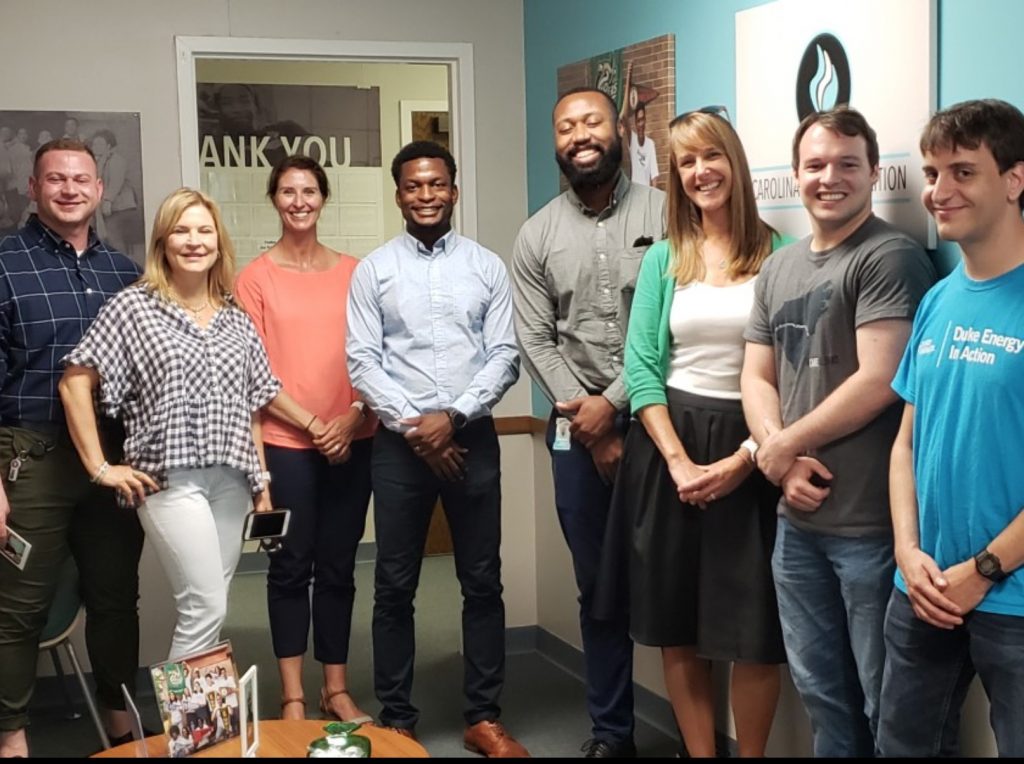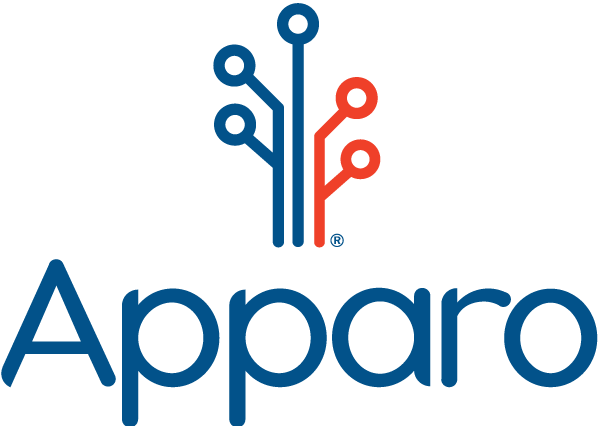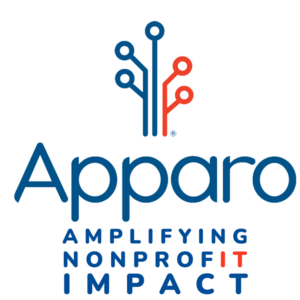Includes 9-month Impact Update follow-up below.
Summer 2020
Carolina Youth Coalition came to Apparo for help with the technology they needed to meet their growth goals.
Carolina Youth Coalition (CYC) is a college-access nonprofit organization that prepares high-achieving, under-resourced high school students to get into, excel at, and graduate from college so they can become full participants in society. Apparo matched CYC with a corporate volunteer team from Duke Energy to help address their technology concerns. Duke Energy also generously funded the project. See PDF of Project Snapshot.

The team delivered a three phased project: 1. tech assessment and roadmap 2. software selection (for volunteer and donor management) 3. set-up of firewalls, web tools and hardware.
CYC Co-Founder Kathryn Kissam told the Duke Energy team at their kick-off meeting that by sharing their skills and expertise they were “changing lives.”
We spoke with Kathryn and her co-founder and Executive Director, Aaron Randolph, to learn more about the current and anticipated impact of this work. Aaron explains that the benefits of the tech plan and new hardware are already being felt. He took us through the key areas of current impact and what he anticipates with the implementation of their selected software solution, Neon.
Operational efficiencies save 250 hours+ of staff time annually to focus on student work and improve volunteer training; they also optimize use of volunteers’ and students’ time.
- Access to printers is not interrupted, eliminating staff waiting time of about 52 hours a year.
- “Improved wifi and new Chrome books make it easy to get students up and running, which saves us a lot of student and staff time. Before, we were dealing with computers that were not working, license and log-in problems. The staff saves 45 hours annually and the students and volunteers aren’t slowed down either; they can get right to work.”
- Neon implementation will improve 3 fundamental processes:
- Volunteer intake – “Currently, we struggle to move volunteers quickly through our intake process. It takes staff 2-3 hours per volunteer for all of the follow-up steps required. A lot of those processes will be automated in a work flow through Neon. That will cut our staff time around this in half, saving 150 hours over the next two years.”
- Donor communications – By automating donor communications in the Neon workflow, 15 minutes of time will be saved per donor, saving 37 hours for staff.
- Student intake – “This process has a lot of checkpoints that can be automated. Currently, it takes 3-4 hours per student for staff work. We cut this to 2 hours, saving 60 hours annually for staff and more as we increase our growth. It also gets students up and running sooner.”
Implementation of Neon is anticipated to increase fundraising revenue through improved marketing, donor experience and leveraging new types of fundraising.
- Improved donor communications and cultivation – “Currently, we don’t have any automated fundraising-related communications processes. Neon will allow us to better execute our online fundraising campaigns, execute multi-year pledges and have higher donor retention due to better communications. We’ll be able to ensure that we are not only attracting new donors, but also cultivating our existing donors. It will ensure that we are not missing any steps with donors, always following through with them and also tracking their engagement.”
- Improved fundraising marketing – “We will also be able to personalize and segment our fundraising emails because we will be able to link them to donors’ profile information. Currently we have two mailing lists. With Neon we can be more targeted with our communication.”
- Enhanced donor experience – “Our current donation process is not integrated into our website. Neon will eliminate a few extra clicks so that the donor experience will be more streamlined. This should drive more donations.”
- Improved access to employer matching funds – “Neon will easily allow our volunteers to track their hours, helping us capitalize on employer matching funds for growing teams of volunteers. We anticipate having 75 next year.”
Risk will be mitigated in several areas.
- Security training for staff helps ensure compliance with best protocols.
- Automated data back-ups will reduce the risk of losing important documents.
- Web filtering tools will reduce the chance of students visiting sites that may put the network at risk.
- A virus attack plan minimizes damage in case of attack.
- Implementation of Neon will ensure accurate reporting and 100% compliance with background check requirements.
New hardware and operational efficiencies will expand program reach and enrich experience for all students.
- “Previously we had not been able to run a whole program of 25 students, where everyone had a device. Now we can actually do that, so we can increase reach. We are at 70 students in program now and are planning for 150 in 2022.”
- “Being more efficient at on-boarding will increase our capacity because we’ll be faster at bringing on volunteers and we will also be able to introduce new volunteer roles, so that more people can plug in to our work.”
Neon will also help decrease several expenses.
- CYC will no longer need their subscription to a form tool, saving nearly $500 annually.
- Some fundraising paper mail will be replaced with digital, leading to approximately $100 annual savings.
- Due to the improved volunteer management process, volunteers will ideally be able take on some staff roles in the future.
Importantly, Neon will also help create an enriched student experience, driving improved ability to fulfill the CYC mission.
- Applied learning from volunteer surveys – “Neon will allow us to do automated monthly volunteer surveys and connect the results to our volunteer profiles. As a result, we will get better at understanding volunteers’ impact on our students and can make improvements continuously to fine-tune the student experience.”
- Improved volunteer training – “Volunteer training will be more thorough and ongoing, so volunteers will be better prepared as mentors to work with our students. The better trained they are, the better the student experience is, which leads to a better sense of trust and better relationships.”
- Faster student on-boarding process – “Students will be better prepared to take advantage of all of the resources we have, even sooner, because we’ll have a stronger, faster on-boarding process.”
As the project wrapped, all members of the team shared their appreciation for each other and for Duke Energy’s support of community engagement.
Kathryn Kissam: “As the Board Chair, I’d like to thank all of you for the time and knowledge you’ve invested into this project. You’ve built our confidence and a road map going forward. As a Board, we’ve been watching and cheering from the side and we’re really grateful. As we looked at our long term strategy, we knew that as a new entity, having a strong tech platform and the right tools and infrastructure in place would be key to securing our donor base and growing appropriately. Otherwise, we might be untangling messes that we created by patchwork. So that’s what I’m most excited about, that we have a solid foundation to build upon as we grow. I’m so glad you were able to feel the big positive impact you are making.”
Aaron Randolph: “What really made this project work was the combination of project management by Apparo combined with the technical expertise of the Duke Energy volunteers. We were able to lean on the extensive knowledge brought by both groups in assessing how to operate currently and the tools we would need to be more efficient in executing and expanding our mission. I would definitely recommend this experience to any nonprofit looking to better leverage technology within their organization.”
Parker Ramsey, Duke Energy: “To see a need and be able to fulfill it with my technical skills was great. I was also able to branch out and build new skills. I’m happy I was able to find a way to contribute with my expertise. It’s very gratifying to help people using what you know. It was also very interesting to get a first-hand perspective into this organization, their needs and how they use technology. At Duke Energy, our management encourages community involvement and gives us time to volunteer. I really appreciate that, as I was able to participate in an experience that allowed me to feel my contribution to something bigger.”
Espoir Tomenou: “At Duke Energy we are encouraged to invest in the community where we serve. It was a wonderful opportunity to learn from my fellow volunteers and to apply what I learned. I’m ready to do it again when there is another opportunity. Many people have impacted my life in such good ways. Helping kids so that they are not left behind, is a great way to give back.”
Winter 2021
Nine months after the completion of this project, we checked back in with Aaron Randolph to learn about the impact and were excited to hear that the work is paying off for CYC.
See PDF of Impact Update Snapshot.
“The good news is that the technology we implemented as a result of this project has been extremely helpful in this virtual environment,” shares Aaron. While the initial focus on this project was to find a new donor management tool, CYC leadership has discovered the power of Neon for much more. It will be instrumental in their ability to grow the program by over 30% (from 90 to 125 students.) “We would not be able to serve our growing number of students without the efficiencies created,” Aaron adds.
CYC is now using Neon for not only donor management, but also student and volunteer management.
New processes around student intake and their data storage are delivering important benefits to students and staff.
“The onboarding time for students has been cut in half,” explains Aaron. “Previously, because of our manual processes to collect documents and schedule interviews, it took around a month before a student could start participating in programs, now it is down to a couple of weeks. We’ve overcome our previous data verification issues that were complicated by email and paper. It was arduous to get the data uploaded to our old system. Now it’s automated into the application process and also sends automated reminders to students who are missing data.”
New students benefit by much faster onboarding and all students benefit from using Neon to register for programs and store their college acceptance and financial aid letters. Not only students benefit, the staff saves 75%+ in administrative time onboarding each new student. This process is down to only 10 minutes (from 45 minutes in the past.)
New volunteer intake and onboarding processes are also quite beneficial.
Aaron explains, “Volunteer onboarding was a very manual process before and some people who wanted to volunteer ended up falling through the cracks. Our staff also wasted a lot of time trying to coordinate trainings for a group of volunteers, when they could have been taking them on their own time, just as effectively.”
Now the application, background check and interview scheduling are all automated via Neon workflows and CYC is working to automate the initial phases of the training process, so that volunteers can take these trainings virtually, asynchronously. This is more convenient for volunteers and a significant time savings for staff. The pre-training administrative time to onboard a new volunteer is decreased by 60%+ (down to 10 minutes, from 30 in the past.)
Because of these improved processes, CYC can onboard large groups of volunteers, which is critical as they work to meet their growth goals. They currently plan to double the number of volunteers in their program in 2022.
Additionally, volunteers use Neon to track their time, which helps CYC track metrics on the mentoring and writing support they provide.
CYC Fundraising is also bolstered.
Aaron summarizes the fundraising benefits that CYC has realized:
- With volunteer and student data easily accessible in Neon, reporting needed for fundraising purposes is easier and more comprehensive.
- Returning donors have an improved experience with prepopulated data and access to portal with their donation history.
- Neon’s functionality expands their fundraising capabilities, allowing CYC to have their first virtual fundraiser this year.
- Neon sends automated acknowledgement letters, which saves significant time in the fundraising process.
Freed time allows CYC leadership more time to focus on activities that enrich their students’ experience.
Aarons shares, “Because of the time we save, we have more time for our students. We have more time to:
- Build relationships with families and students, driving increased attendance and retention
- Build relationships with volunteers, improving their service to students and retention
- Improve volunteer training, increasing volunteers’ confidence and effectiveness, and
- Plan programming to meet needs of students.”


